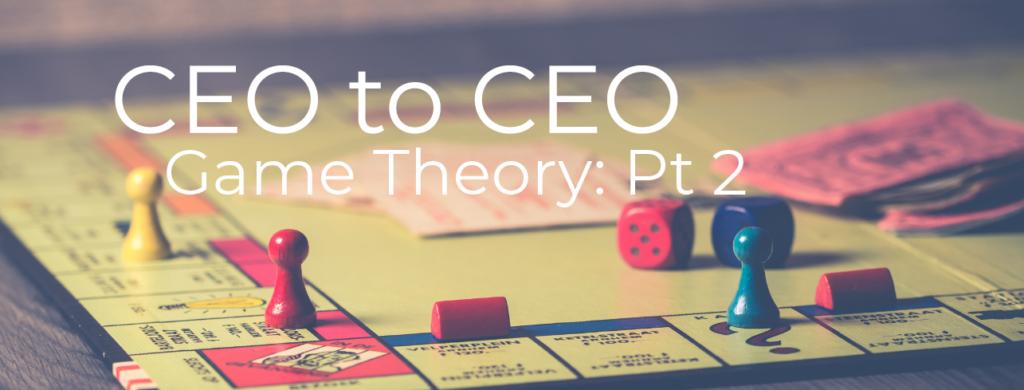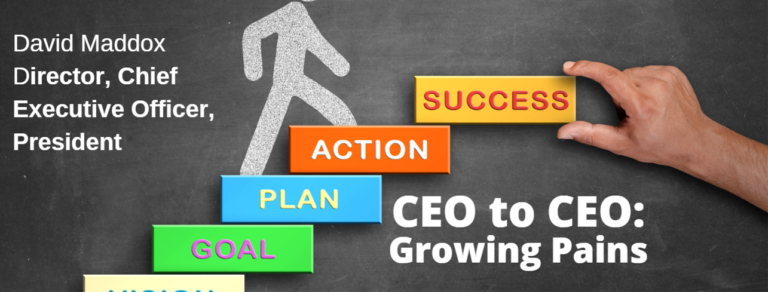CEO to CEO: Game Theory Pt. 2

In Game Theory Part I, we talked about how and why every challenge in life constitutes “a game.” Seeing the problem as a game reminds us that there are rules which apply, there are strategies and tactics to winning, skill is developed through intelligent practice, good practice lies within the context of grasping the fundamentals and their applicable functions, winning is consistently achievable through application of skill and resources within the appropriate scope and setting, and—perhaps most of all—we approach the challenge with hope and joy because games are fun!
Now let’s look more deeply into the first stage of learning the game. If you have ever taken a few minutes to read the rules of any game, you probably remember that the instructions typically begin with identifying “the object” of the game.
In Monopoly, the object is to survive until the end—to bankrupt all the other players before they bankrupt you. In soccer, the object is to score more goals than the other team. In business, the details may vary but a theme for successful objectives defines the goal something like this:
“I wish to deal honorably with the public as I provide goods/services to my customers/clients which methodically and increasingly: (a) meet or exceed industry standards, (b) build my business through developing the individual potential of both myself and others, and (c) serve society such that I am financially rewarded for my efforts and sacrifice.”

Of course, a big-picture objective is general by nature. To achieve it, one must break it down into more specific smaller objectives—each of which constitutes a game within itself.
For example, if a child’s goal is to become a professional basketball player, he must spend thousands of hours developing expertise in the fundamentals of basketball—dribbling, passing, inside shots, outside shots, foul shots, rebounds, assists, and increasingly complex plays which interweave offense and defense and which capitalize on the team’s strengths in light of the opposing team’s strengths and weaknesses.
He might make a game of his free-throw percentage, and plays lots of one-on-one along with other games like Horse anD Tip-It to develop specific skills in shooting and rebounding. The most important factors, such as proper form and teamwork, invariably require practice under the guidance of good coaching over many years. Lots to learn and do overtime. Just like every other career.
In watching beginners learn any game, two attributes become quickly apparent—natural aptitude and coach-ability. Every experienced basketball coach knows that as much as she wants the superstar, natural-talent player, coach-ability is by far the most important characteristic. She knows that she can build a great team with coachable players who have below-average natural talent because through coach-ability she can develop talent to a level that far exceeds the average. But the kid with oodles of raw natural talent will never realize his potential, or even function as a strong member of the team if he cannot see past his own (self-perceived) greatness and learn from others.
Outside the structure of organized sports, we see the difference between those who presumptuously “wing it,” intuitively trusting their natural talent and true students of the game—who “see” their own blind spots and know that they need to learn about what they don’t know in order to ever master a position in their chosen field—even at an elementary level.
Think of a game you know somewhat well—perhaps a card game such as poker, blackjack, or spades. When someone joins who lacks insight, he won’t know when to “hold ‘em” and when to “fold ‘em.” He won’t know when to walk away, or when to run. He might enjoy some “beginner’s luck,” but before long he is going to lose. Then he will either quit, learn, or keep on losing.

If he learns, he will access the expertise of others (become coachable) or he will “learn the hard way”—insisting upon the “safety” of trial-and-error on his own. Sure, there is plenty of appropriate space for self-study and -exploration; but a student without an appetite for guidance will invariably develop bad habits which inhibit growth and ultimately result in subpar performance.
What game are you facing? Do you know the rules? Have you spent the time necessary to understand them—to know their implications? Rules govern strategy, and therefore decision-making. If the football coach doesn’t know exactly what it takes to have the referee’s call overturned on review, he’s guessing when he decides whether to burn a timeout after a questionable call.
And do you know the fundamentals? For an ABA practice, the fundamentals include clinical aptitudes—writing treatment plans, pairing/rapport development, coping with parents, hiring techs, keeping good notes, implementing protocols, etc.—but they also include knowing your market—supply/demand ratios, insurance reimbursement rates, competitive pay rates, regulatory hurdles, how to build and maintain your team. There are also a host of admin functions to consider—billing, collections, policies, procedures, marketing, payroll, etc.
You may not be an expert at all the rules and all the fundamentals, but they are the foundation for playing the game well. You will, in fact, never master them all. It takes a team to excel at any business—particularly one as complex as ABA. But without at least some cursory knowledge of both the rules and the fundamentals, how will you choose your teammates? How will you choose your coaches? And how will you evaluate your working assumptions as you move along on your journey?
When writing a treatment plan, a BCBA determines objectives and sets individual goals designed to meet the larger objectives. The process is possible because the BCBA has knowledge of how to evaluate the client’s behavior, the options available for treatment, what it likely takes to achieve each goal, and the experience and professional capacity to guide the process to a successful outcome.
Business development game theory is the same. After determining your larger, overarching objectives, survey the rules and fundamentals. Identify and prioritize your best opportunities—the ones which, like the goals in a treatment plan, are likely to most effectively replace chaos with functionality, productivity, and a more peaceful environment for you and yours.

If you know where you are going and have studied the map, you likely have the self-confidence necessary to invite input from others to help you chart your course—confidence derived from sufficiently knowing your own mind while simultaneously valuing the additional knowledge and perspective available from others. With clear objectives and a compressive grasp of the rules and fundamentals, you are ready for some of the best fun of all—strategy.
We end this piece at the doorstep of Strategy. But Strategy isn’t the end. They say “Novices talk strategy while experts talk tactics.” That’s true, but only because the experts are so devoted to grasping objectives, rules, fundamentals, and strategy, that these more basic aspects of Game Theory have become second nature and form the context necessary to talk tactics without losing perspective. They can talk about the tree without forgetting the forest, where that tree stands in the forest, how treating a given tree affects the forest, which trees require priority attention given their larger concerns for the forest, etc.
Where are you along the path to seeing your project as a game and playing that game well? Have you firmly determined your objective? Do you know the rules? How comprehensively can you identify the fundamentals? Are you comfortably engaging with the wisdom of others to develop your strategy? (Solomon said that every purpose is established through a multitude of counsel.)
Have the rules and fundamentals become so second nature to you that strategy is easy and tactics are well-integrated within the whole of your business? If so, you are enjoying a momentum that substantially carries you forward—a momentum derived primarily from a well-integrated series of decisions that you have made and executed over months and years, rather than from your specific efforts made today or last week. You have balanced, healthy, mutually-beneficial relationships with a lot of people. And you are winning!


